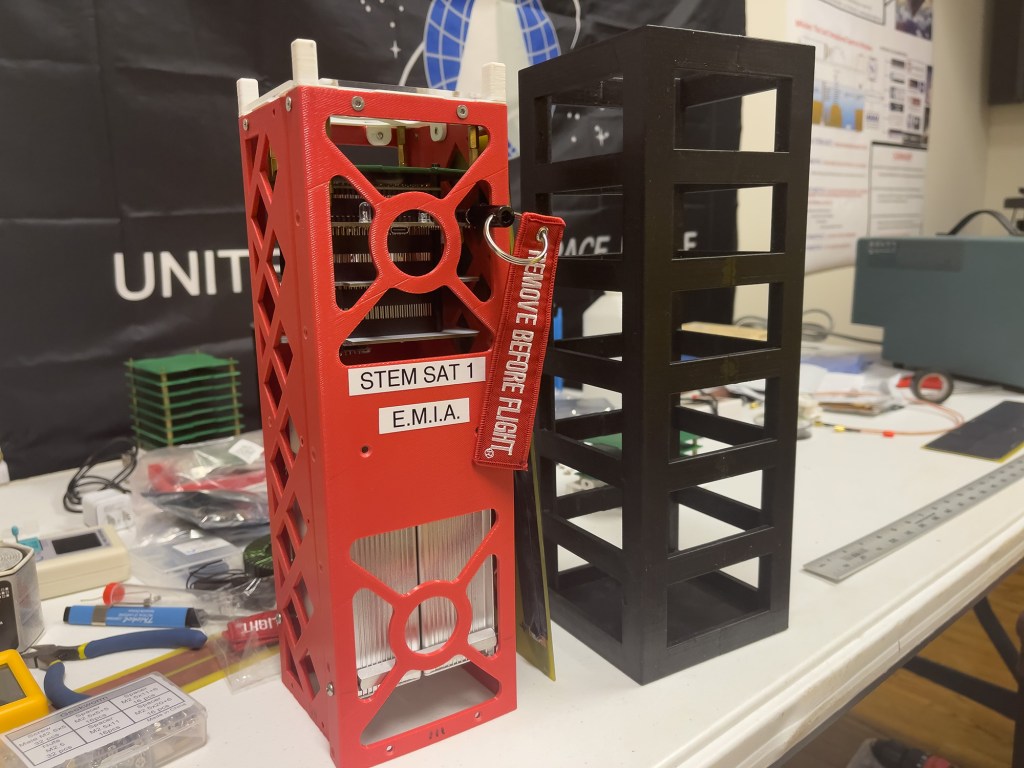“A galaxy far, far away,” McCain talks low frequency signals
Published 12:00 pm Tuesday, November 8, 2022

- Athens State University’s engineering model integration aid.
Students from around the world will have the opportunity to participate in a collaborative learning effort with Athens State University as they set their sights on a December 2023 launch for their STEM SAT.
The Aerospace Systems Management program hopes to have its Engineering Model Integration Aid completed by the end of this year to begin environmental testing in the spring.
“What we’ll do is we’ll put it in one of their chambers and condition it down to, like, minus 65 degrees Fahrenheit and soak it down there for a few days, and then we’ll raise it back up to 165 degrees Fahrenheit and leave it there for a few days and then cycle it back and forth,” McCain explained. “We will all also be doing vibration and shock on it that will simulate the lift off of the rocket and just prove that it’s structurally sound enough to survive that.”
“What you’re seeing here is basically a 3D printed frame, that all of the contents of the satellite are contained within,” McCain said.
The unit uses lithium ion batteries similar to what would be found in a cellphone and many other household electronics and will have four solar panels.
The dispenser will be approximately the size of a loaf of bread, and the unit will sit down inside of it.
“Once it’s ejected from a dispenser, the panels will fold out, and there’s an antenna that is going to be folded up underneath them that will actually be made of short pieces of a tape measure,” McCain said.
“It’ll actually be covered on the outside with aluminum, and there will be, on the back of the satellite, micro switches that once you move it away from the back of the storage container here, it will tell the circuit board that ‘okay, we’re being dispensed,’ so it will automatically start an electronic counter,” McCain explained. “We’ll send a signal from this card and burn a small piece of nichrome wire in two. It’s been holding this together and all this stuff is gonna be spring loaded, so as soon as you burn that little wire and the strap falls away, then the solar panels will come out.”
The door on the container will be controlled with a signal from the main rocket, and once it opens up, the spring will push the satellite out. This will activate the micro switches and signal the satellite that it is okay to wake up.
Cube sats, otherwise known as ride-along payloads, piggyback off already paid for missions. They are stored underneath the main payload, and once it is ejected and out of the way Athens’ satellite (as well as others) will be ejected out of the rocket to begin their missions.
Vaya Space in Cocoa Florida is the company who will handle the launch.
“We’re going to be in basically a 300-mile high orbit that will have an inclination from the equator of 59 degrees, so that will mean that it will pass over a large portion of the United States several times a day and have a good wide footprint where we can listen to the signal from on the ground,” McCain explained.
The satellite Athens State is launching will have a very low frequency receiving antenna that will receive signals that don’t penetrate Earth’s atmosphere.
“Unless you’re above the atmosphere, you’ve never heard some of this stuff, so who knows what we might hear,” McCain said.
The satellite will listen to signals from Jupiter and its moon “Io.”
“They have an interaction that creates signals that are very interesting,” McCain said.
The satellite will also pick up frequencies from our sun.
“There are some signals theoretically that go all the way back to the Big Bang,” McCain said.
The receiver will receive these frequencies and translate them to a UHF frequency that can penetrate the Earth’s atmosphere. The data will be transmitted back to Earth where students all around the world will be impacted by the collection.
Students from around the southeastern United States, the United Kingdom, South Africa, and Hawaii have built simple receiving stations to receive the transmitted data as the satellite passes over, which will then be sent back to Athens State once the telemetry and the signals are decoded.
“It’s going to be so exciting, because kids all over the world will be able to pick up our little satellite,” said McCain.





